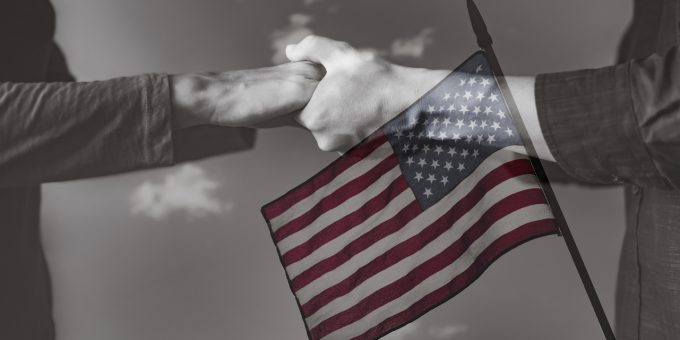
"I won't leave you here, I promise." // iStockPhoto, kieferpix
Navigating the Path to Legal Status: An Undocumented Immigrant’s Story, Pt. 1
Part 1: “No Matter What Happens, Please Don’t Leave Me Here”
In 1990, my parents brought our family across the Mexican/American border. I was two years old. The subsequent thirty-two years of my life were marked by a condition of “illegality,” which concluded only after a painstaking legal process that granted me U.S. permanent residency on May 26, 2022. Despite my newfound legal status, I still do not identify myself as American. It’s not that the culture feels unfamiliar or that I lack language proficiency. Rather, my reluctance to embrace an American identity stems from my conviction that the United States has denied me the humanity I deserve. This harsh realization surfaced prominently during my journey toward legality.
In this three-part blogs series, I delve into the complexity of adjusting legal status for immigrants without initial lawful entry, based on my personal experiences with the U.S. consulate in Ciudad Juarez, Mexico. My experiences show how the process of obtaining legal status in the United States, specifically via the U.S. consulate in Ciudad Juárez, Mexico, acts as a significant form of punishment and subjugation, amplifying the burden of “illegality.”
May 17, 2022
When my “Writing for Publication” class concluded just after 4:30pm, I took the elevator down to the ground floor and walked east toward the parking lot. As I settled into the driver’s seat of my car, the familiar scent of the interior offered a strange comfort. I pushed the ignition button, and the engine hummed to life.Suddenly, my hand froze. An unyielding wall of dread seemed to prevent me from shifting the gear lever into drive. In that moment, I was lost in a sea of uncertainty. Tears, unbidden and unstoppable, began to stream down my face. They were the physical manifestation of an emotional storm raging within me—fear, apprehension, and a profound longing for comfort that remained elusive. The act of starting the car, once a symbol of the journey home, now marked the beginning of an entirely different journey, one that lead me into the labyrinth of legality, fraught with hidden pitfalls. On that day, leaving the parking lot meant confronting one of two futures: I would either gain status as a permanent resident, liberated from the shackles of “illegality,” or I would be banished from the place I had come to call home. It was in this moment, seated in the car in the dimming afternoon light, that I realized my life was on the precipice of an irreversible transformation.
May 18, 2022
The next morning, my husband and I found ourselves amidst the bustling crowd at the Tijuana airport, preparing to board our connecting flight to Ciudad Juarez. As our departure time neared, the chatter of the airport lounge became a backdrop to my growing anxiety and fear. I felt the cold, hard bench beneath me, the uneasiness making my heart pound in my chest. The uncertainty of what lay ahead was overwhelming. Tears once again welled up in my eyes, spilling over and staining my cheeks as I sat in this sea of strangers, all caught up in their own journey, oblivious to mine.
Turning to my husband, my voice trembling and choked with emotion, I pleaded, “No matter what happens, please don’t leave me here. I don’t belong here.” The vulnerability in my words echoed the fear deep within me. My husband looked at me, his eyes reflecting the same worry and dread, his voice wavering as he replied, “I won’t leave you here, I promise.” A pact made in the crowded airport, binding us together in the face of the unknown. His words hung in the air, followed by a vow that if I were denied U.S. residency, we would uproot our lives and start anew in Mexico. We would sell all of our belongings. We would find a way to make it work. As my husband spoke, the weight of our situation sank in. Our future was shrouded in uncertainty, held hostage by decisions beyond our control. But we were in it together, ready to face whatever the future had in store for us.Legal violence encapsulates the distress—physical, emotional, and psychological—inflicted upon individuals through the routine and seemingly neutral enforcement of laws that govern their lives. This form of violence is not exclusive to undocumented immigrants. For instance, in mixed-status families, documented members may not face the risk of deportation, but they live shrouded in persistent anxiety and insecurity due to the looming threat of losing a loved one to the immigration system. The damage inflicted on immigrants and their families is expansive and enduring.
Leaving the United States in the process of securing U.S. residency underscored my peripheral status. I had always known my legal status in the United States was precarious, but being on the other side of the border with no certain return path made that reality undeniable. This state of limbo left me without a legal or social home, inflicting emotional and psychological harm.I’m not the only one who has suffered from this. The impact of legal violence extends beyond immigrants to affect U.S. citizens as well. In my case, the uncertainty surrounding my future legal status profoundly affected my husband and our circle of family and friends. Throughout the process, we were forced to plan for a potential upheaval of our lives—a disruption that would not only upend our own lives but also the lives of others who depend on us for support. Little did I know, that moment in the Tijuana airport was only the beginning of a long and traumatic journey, one that would etch itself in the depths of my soul.
Jozef C. Robles is a Ph.D. student in the Sociology Department at the University of California, Irvine. His work explores the transformative impacts of immigration law on immigrants’ lives.
Read Part 2 of this 3-part series.

Comments